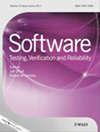IEEE International Conference on Software Testing, Verification and Validation (ICST 2020)
IF 1.2
4区 计算机科学
Q3 COMPUTER SCIENCE, SOFTWARE ENGINEERING
引用次数: 0
Abstract
This special issue contains articles which are extended versions of some of the best papers presented at the IEEE International Conference on Software Testing, Verification and Validation (ICST 2020). ICST is intended as a common forum for researchers, scientists, engineers and practitioners throughout the world to present their latest research findings, ideas, developments and applications in the area of Software Testing, Verification and Validation. The articles are ‘ Fostering the Diversity of Exploratory Testing in Web Applications ’ , by Leveau et al., ‘ RVPRIO: a Tool for Prioritizing Runtime Verification Violations ’ , by Cabral et al., and ‘ Automated Black-Box Testing of Nominal and Error Scenarios in RESTful APIs ’ , by Corradini et al., covering diverse topics in software testing and verification. In the first article, the authors investigate exploratory testing, a form of software testing that leverages business expertise, in the context of web applications. They propose a new approach that monitors online interactions performed by testers to suggest new interactions, thus enabling deeper explorations of the applications. In the second article, the authors leverage machine learning to prioritise violations reported by runtime verification, leading to the discovery of previously unknown bugs in open-source projects. In the third article, the authors develop black-box testing techniques for RESTful APIs, a mainstream approach for web API design, leading to the discovery of new faults in already deployed web services. We would like to thank the authors for submitting their contributions and the reviewers for their excellent job. We would also like to thank Rob Hierons for kind guidance and great patience with this volume.IEEE软件测试、验证和确认国际会议(ICST 2020)
本期特刊包含的文章是IEEE软件测试、验证和验证国际会议(ICST 2020)上发表的一些最佳论文的扩展版本。ICST旨在为世界各地的研究人员、科学家、工程师和实践者提供一个共同的论坛,展示他们在软件测试、验证和验证领域的最新研究成果、想法、发展和应用。这三篇文章分别是Leveau等人的《促进Web应用程序中探索性测试的多样性》、Cabral等人的《RVPRIO:对运行时验证违规进行优先排序的工具》和Corradini等人的《RESTful api中标称和错误场景的自动黑盒测试》,涵盖了软件测试和验证中的各种主题。在第一篇文章中,作者研究了探索性测试,这是一种在web应用程序环境中利用业务专业知识的软件测试形式。他们提出了一种新的方法,该方法监视由测试人员执行的在线交互,以建议新的交互,从而能够对应用程序进行更深入的探索。在第二篇文章中,作者利用机器学习来优先处理运行时验证报告的违规行为,从而发现开源项目中以前未知的错误。在第三篇文章中,作者开发了RESTful API的黑盒测试技术,这是web API设计的主流方法,可以发现已经部署的web服务中的新故障。我们要感谢作者的贡献,感谢审稿人的出色工作。我们还要感谢Rob Hierons对本书的善意指导和极大的耐心。
本文章由计算机程序翻译,如有差异,请以英文原文为准。
求助全文
约1分钟内获得全文
求助全文
来源期刊

Software Testing Verification & Reliability
工程技术-计算机:软件工程
CiteScore
3.70
自引率
0.00%
发文量
34
审稿时长
>12 weeks
期刊介绍:
The journal is the premier outlet for research results on the subjects of testing, verification and reliability. Readers will find useful research on issues pertaining to building better software and evaluating it.
The journal is unique in its emphasis on theoretical foundations and applications to real-world software development. The balance of theory, empirical work, and practical applications provide readers with better techniques for testing, verifying and improving the reliability of software.
The journal targets researchers, practitioners, educators and students that have a vested interest in results generated by high-quality testing, verification and reliability modeling and evaluation of software. Topics of special interest include, but are not limited to:
-New criteria for software testing and verification
-Application of existing software testing and verification techniques to new types of software, including web applications, web services, embedded software, aspect-oriented software, and software architectures
-Model based testing
-Formal verification techniques such as model-checking
-Comparison of testing and verification techniques
-Measurement of and metrics for testing, verification and reliability
-Industrial experience with cutting edge techniques
-Descriptions and evaluations of commercial and open-source software testing tools
-Reliability modeling, measurement and application
-Testing and verification of software security
-Automated test data generation
-Process issues and methods
-Non-functional testing
 求助内容:
求助内容: 应助结果提醒方式:
应助结果提醒方式:


